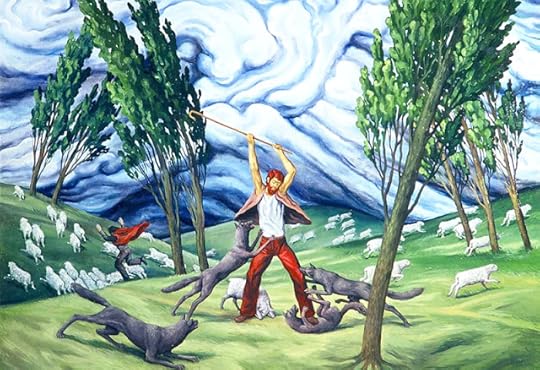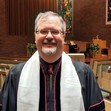Taking Care of the Sheep—Lectionary Reflection for Easter 4B (John 10)

 Peter Koenig, The True Shepherd and the Wolves
Peter Koenig, The True Shepherd and the Wolves John10:11-18 New Revised Standard Version Updated Edition
11 “I am the good shepherd. The goodshepherd lays down his life for the sheep. 12 Thehired hand, who is not the shepherd and does not own the sheep, sees the wolfcoming and leaves the sheep and runs away, and the wolf snatches them andscatters them. 13 The hired hand runs away becausea hired hand does not care for the sheep. 14 I amthe good shepherd. I know my own, and my own know me, 15 justas the Father knows me, and I know the Father. And I lay down my life for thesheep. 16 I have other sheep that do not belong tothis fold. I must bring them also, and they will listen to my voice. So therewill be one flock, one shepherd. 17 For this reasonthe Father loves me, because I lay down my life in order to take it upagain. 18 No one takes it from me, but I layit down of my own accord. I have power to lay it down, and I have power to takeit up again. I have received this command from my Father.”
*****************
Perhapsthe most beloved passage of scripture of all is Psalm 23. It is the scripturepassage most often chosen for funerals. Even if a family doesn’t know muchscripture, they likely know this Psalm. They take comfort in the declarationthat “The Lord is my shepherd, I shall not want.” The fourth verse reads:“Though I walk through a valley of deepest darkness, I fear no harm, for Youare with me; Your rod and Your staff—they comfort me” (Ps. 23:4 Tanakh, JPS).That image of God, the shepherd, who provides for and protects the sheep, isappropriated here in John 10, as Jesus claims to be the Good Shepherd. In apreview of what is to come, Jesus speaks of himself laying down his life forthe sheep.
As anaside, although this shepherding image is appropriated by the churches to speakof clergy, we must be careful in how we use the image. We may be pastors, butwe are not God or Jesus. As for the people in the church being sheep, thatimage is also problematic, for it suggests an image of spiritual dependence onclergy that can lead to passivity and manipulation (on both ends—I know thisfrom experience). So, while God is ourshepherd, and we are the sheep of God’s pasture, we need not be passive in theway we live our faith.
TheFourth Sunday of Easter is known as “Good Shepherd Sunday.” The Gospel readingsfor Good Shepherd Sunday draw from John 10, where Jesus speaks of himself asthe Good Shepherd. These passages are read along with Psalm 23. In thesepassages from John 10, Jesus addresses a concern for the community goingforward. He contrasts the Good Shepherd who willingly lays down one’s life forthe sheep with the hired hand who runs away when danger approaches. While thehired hand doesn’t have ultimate responsibility for the sheep, such that the hiredhand doesn’t care for the sheep, unlike the Good Shepherd to whom the sheepbelong.
Jesus tellsus here that he is the Good Shepherd. Therefore, he knows his sheep, and thesheep know him. That mutual knowledge reflects the relationship Jesus has withthe Father, whom he knows and who knows him. Knowing here speaks of arelationship that exists between Jesus and the sheep and between Jesus and theFather. Because of the depth of the relationship, such that Jesus cares for hissheep deeply, he is willing to lay down his life for the sheep. That is, thegood shepherd is all in, unlike the hired hand who is only in it for the money(and shepherds didn’t make a lot of money).
As for Jesus, when confronted withdanger, he doesn’t flee but stands firm, laying down his life for his friends.However, even as he laid down his life, he would take it up again. Indeed,Jesus tells his audience “No one takes it from me, but I lay it down of my ownaccord. I have power to lay it down, and I have power to take it up again” (Jn.10:18). As for the authority to do this, it came to him from his Father. This reference to taking up his life connectsour reading with the overall message of Eastertide, that of Jesus’resurrection.
One verse that stands out to me isverse 16. In that verse, we hear Jesus declare: “I have other sheep that do notbelong to this fold. I must bring them also, and they will listen to my voice. So,there will be one flock, one shepherd.” Who might these other sheep be to whomJesus must go, so that there might be just one flock? It is important to notethat these “other sheep” will listen to his voice. That would seem to suggestthat they also belong to Jesus. My interest in this verse is rooted in my long-standinginvolvement in interfaith and ecumenical ministry. While it likely is areference to the growing presence of Gentiles in what originally was a Jewishsect, might it have more to say to us as a predominantly “Gentile” church as welive out our faith in a pluralistic world?
We might start by asking thisquestion as laid out by Stephen Cooper:
The “other sheep” of today must bedetermined by the setting in which the word is preached and heard. Who are“other” for us? This line of questioning brings the affluent churches of thedeveloped world into discomforting reflections on the “other” in our midst—inour own societies— and the “others” elsewhere in the world. Both “others” areon the margins of our horizons, the horizons established through circumstance,habit, and counsels of prudence. The key point is that these “others” are Christ’ssheep, just as we are, and they too recognize his voice. [Feasting on the Word, p. 450].
In an increasingly divided world economically andpolitically, our religious divisions, starting within the larger Christiancommunity, work against the idea that we are one flock with one shepherd.Despite decades of ecumenical efforts, we seem as divided as ever. The Lord’sTable, which should be a symbol of unity, remains a point of contention.Efforts to bring about full communion among denominations continue to be achallenge, especially in light of the decline of churches. While the boundariesare less narrow and rigid than they once were, especially when we think of laypeople who move easily from one church to another, they still exist even thoughwe all claim to be part of Christ’s flock. We often divide ourselvesideologically, such that liberals and conservatives each look at the other withdisdain, and thus we tend to live in our own ideological silos while claimingto represent Jesus. Therefore, it would appear that God dislikes the samepeople I dislike. So, who are these other sheep? We might also ask who isn’t present in ourcongregations and fellowship circles. Most churches are racially/ethnicallysegregated. While we can rationalize this as an expression of cultural andlanguage differences, there is an “otherness” to this reality. Economicbarriers are often in play. There are the theological barriers mentioned above,as well as ideological/political barriers. My denomination, especially clergy,was one rather purple. We’re now quite “blue.” Then there is the full inclusionof LGBTQI persons in our faith communities. How might these differences bebridged? What does it mean to say “All are welcome?” Are we open to welcomingthose who hear and respond to Jesus’ voice but are not of “our flock?”
Things get even trickier when wethink in terms of our interfaith relationships. How might they listen to Jesus?I could adopt the idea of the “anonymous Christian,” but that seems ratherpaternalistic. Nevertheless, might we find some shared place of spiritualfellowship that reflects Jesus’ embrace of other sheep? Does Jesus lay down hislife for my friends whose faith professions differ from mine? How might I dothe same?
John invites us to listen to thevoice of the Good Shepherd, who lays down his life for us (and takes it backup). Jesus tells us that the shepherd knows the sheep and the sheep know theshepherd, might we know the shepherd well (be in a relationship with him), knowingthat the shepherd leads us to green pastures and still waters while preparing atable for us in the presence of our enemies. May this be true for us thisEaster season as the Savior leads us “like a tender shepherd.”



